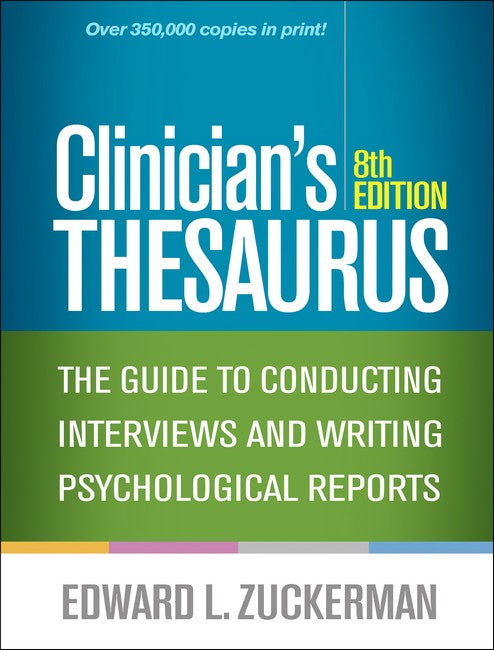Getting Oriented to the Clinician's Thesaurus A Functional Guide to Report Construction I. Conducting a Mental Health Evaluation 1. Beginning and Ending the Interview 2. Mental Status Evaluation Questions/Tasks 3. Questions about Signs, Symptoms, and Other Behavior Patterns II. Standard Terms and Statements for Wording Psychological Reports A. Introducing the Report 4. Beginning the Report: Preliminary Information 5. Referral Reasons 6. Background Information and History B. The Person in the Evaluation 7. Behavioral Observations 8. Responses to Aspects of the Examination 9. Presentation of Self 10. Emotional/Affective Symptoms and Disorders 11. Cognition and Mental Status 12. Abnormal Signs, Symptoms, and Syndromes 13. Personality Patterns C. The Person in the Environment 14. Activities of Daily Living 15. Social/Community Functioning 16. Couple and Family Relationships 17. Vocational/Academic Skills 18. Recreational Functioning 19. Other Specialized Evaluations D. Completing the Report 20. Summary of Findings and Conclusions 21. Diagnostic Statement/Impression 22. Recommendations 23. Prognostic Statements 24. Closing Statements III. Useful Resources 25. Treatment Planning and Treatment Plan Formats 26. Formats for Reports, Evaluations, and Summaries 27. Treatments for Specific Disorders and Concerns 28. Listing of Common Psychiatric and Psychoactive Drugs 29. Psychiatric Masquerade of Medical Conditions Appendices A. Abbreviations in Common Use B. Annotated Readings in Assessment, Interviewing, and Report Writing Feedback Solicitation Form References About the Clinician's Electronic Thesaurus, Version 7.0

